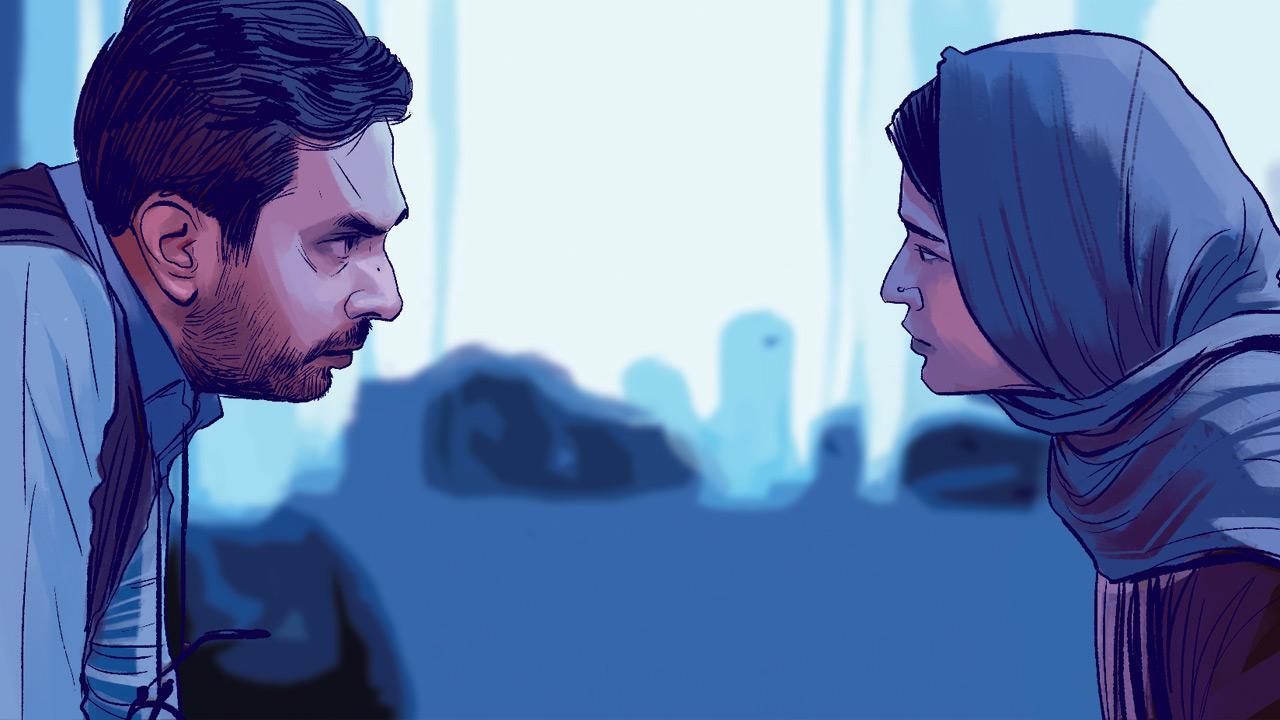Azmeri Haque Badhan plays RMN’s titular protagonist, Rehana Maryam Noor, a doctor and assistant professor in a medical school.

Illustration/Uday Mohite
Abdullah Mohammad Saad’s Rehana Maryam Noor (RMN) that just premiered at the Cannes Film Festival’s Un Certain Regard, is one of the most stunning films in recent memory. It has made history as Bangladesh’s first feature film to make it to Cannes’ official selection—19 years after Tareque Masud’s Matir Moina (The Clay Bird) was in Directors’ Fortnight, a parallel section, in 2002. India has no fiction feature at Cannes this year, but we do have Payal Kapadia’s The Night of Knowing Nothing (Directors’ Fortnight, experimental docu-fiction) and Rahul Jain’s Invisible Demons (Cinema for the Climate, documentary).
Azmeri Haque Badhan plays RMN’s titular protagonist, Rehana Maryam Noor, a doctor and assistant professor in a medical school. She summarily expels a student for apparently cheating in an exam. Later, she witnesses another student, Annie, emerging distressed from Prof Arefin’s (Kazi Sami Hassan) room, following sexual assault. Furious when Annie refuses to pursue the case, Noor decides to claim it was she who got raped, in order to get justice: she wants the rapist to resign, to prevent him assaulting other students. Not only does Noor pay a very high personal price in her obsessive quest for justice, but her stubborn ethics disturbingly impacts her little daughter Emu (Afia Jahin Jaima). We see the cyclical nature of violence across generations in a patriarchal society that, by almost always quickly dismissing women’s experiences of the truth, actively enable rapists and bullies to get away and thrive.
Saad’s powerful monochrome debut feature Live from Dhaka, on a frustrated man struggling to get out of the country, was at the Rotterdam Film Festival, and it won Best Director for Saad and Best Actor for Mostafa Monwar at the Singapore Film Festival in 2016. RMN’s biggest strengths are a compelling performance by its lead, Azmeri Haque Badhan and Saad’s outstanding screenplay. His screenplay is in the same class as Asghar Farhadi’s finest work, in terms of moral complexity. Also, it is rare and thrilling to see such powerful images of strong, financially independent Muslim women in South Asian feature films, especially single mothers; all the more daring for coming from a secular nation with Islam as its state religion.
Indian subcontinental cinema has a long history of male directors being ‘equalists,’ if not feminists. Saad delivers a masterstroke: RMN’s protagonist is not the victim of rape, but a witness, thereby indicting all of us who may be witnesses or aware of rape, but unlike Noor, refuse to go all the way till justice is served. More importantly, creating sympathy for the victim or witness is a low-hanging fruit that doesn’t interest Saad. If anything, he goes out of his way to make it challenging for the audience to empathise with his protagonist, even though she is obviously fighting for the right thing. In doing so, Saad raises the bar incredibly high: RMN is not only a fantastic film, it is also a demanding film, yet deeply rewarding, leaving you with a welter of morally complex positions on rape and consent. It is also painful to watch reality reflected: how swiftly women who call out rapists are punished, and in a perverse subcontinental specialisation, how manipulative men swiftly turn the tables, portraying the victims of rape as perpetrators of injustice against men. Noor nearly destroys herself, as well as those around her, in her quest for justice.
Saad is in absolute control of his craft. Badhan’s performance is magnificent, as the severe Noor struggles to contain the inner violence engendered by her moral force, yet retorts with a remarkably cold confidence when bullied, rarely seen in women in hijab in our cinema. It is rare to find such a fine screenplay as Saad’s in India, and it is a masterclass in itself. Cinematographer Tuhin Tamijul’s unrelenting close-ups of Noor give the film a claustrophobia, enhanced by the cold blue tints throughout the film, all shot in an antiseptic hospital-related setting, as if to leach out all distraction. The second half plays like a feminist thriller, with Saad’s twists and razor sharp editing. Sayeba Talukder’s sound design is effective. The film is a Bangladesh-Singapore-Qatar production; Jeremy Chua (Singapore) is the producer, with co-producers Rajib Mohajan, Sydul Haque Khandaker and Adnan Habib.
Indeed, three top Bangladeshi directors have recently addressed #MeToo—Saad, Mostofa Sarwar Farooki’s web series Ladies & Gentlemen that dropped on Zee5 Global on July 9, and Rubaiyat Hossain’s Made in Bangladesh. One could consider them part of a Bangladeshi New Wave, along with several other directors. Can’t wait for sub-continental audiences to see this film. Take a bow, Bangladesh!
Meenakshi Shedde is India and South Asia Delegate to the Berlin International Film Festival, National Award-winning critic, curator to festivals worldwide and journalist.
Reach her at meenakshi.shedde@mid-day.com
 Subscribe today by clicking the link and stay updated with the latest news!" Click here!
Subscribe today by clicking the link and stay updated with the latest news!" Click here!







